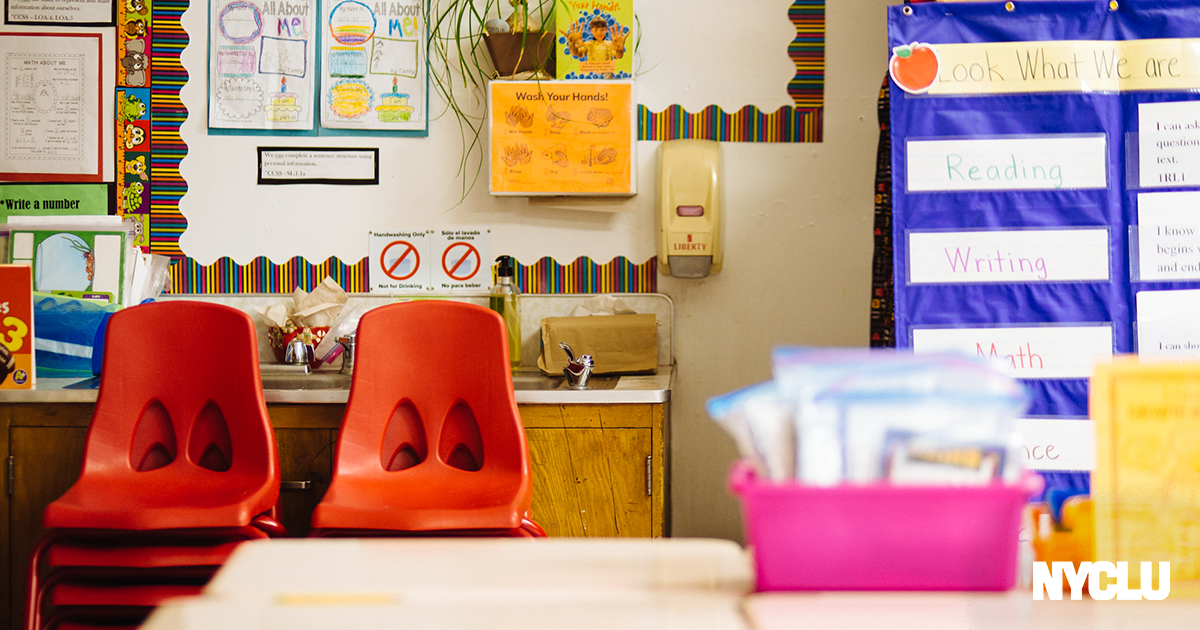The Backlash Against Racial Justice Has Come to NY Schools

By Toni Smith-Thompson
As the movement for racial justice in our country grows, so too does the backlash. This reaction represents a revolt to maintain power structures that keep white supremacy embedded in our country and has emerged everywhere people have demanded racial equity.
In the midst of mass protests against police officers killing Black people, law enforcement reacted by violently suppressing protests. Lawmakers eager to maintain unchecked police power introduced at least 81 anti-protest laws in 34 states. After Black and Latinx voters proved critical to securing President Joe Biden’s victory — and to Democrats taking over the U.S. Senate — 14 states enacted new laws making it harder for people of color to vote.
And now these same reactionary forces have set their sights on the classroom. In the last several months, nearly half of all states have introduced or passed legislation banning discussion of race or racism in schools.
The people leading this latest backlash are using misinformation to convince parents and the broader public that there’s something sinister going on in our public schools. But the reality is the people supporting this legislation simply do not want students to learn about racism and discrimination in our country.
For instance, a new law in Texas effectively bans educators from teaching their students about racism and dictates that social studies and civics teachers “may not be compelled to discuss current events or widely debated and currently controversial issues of public policy or social affairs” in their classes. The legislation in other states includes similar provisions.
Red state legislators are not the only government actors reaching into classrooms to control and censor discussions of historical and current events. The NYCLU’s offices across New York state have gathered reports of police and police unions trying to control what students learn and using schools as their own PR machines.
In Smithtown, Long Island, the Suffolk County Police Department endorsed a slate of school board candidates promising to stop any discussion of race or racism in district schools.
The current backlash and censorship campaign is anti-democratic, anti-truth, and violates the responsibility of our schools to provide an equitable and inclusive education for all students.
In Clarkstown, a New York City suburb, the Rockland County Patrolman’s Benevolent Association (a police union) used social media to slam a planned student presentation about the importance of valuing Black lives, which included data on protests against police brutality. The PBA applauded community members who rallied against the 8th-graders’ presentation and called on the school board to stop the presentation, which was a part of the school’s “No Place for Hate Week.”
The presentation was subsequently cancelled and the superintendent announced he would meet with the police chief about the matter.
In Binghamton, the local police union publicly opposed a class reading a book about a Black child grappling with police violence, stating “We hope that the Binghamton Central School District will work to assure their students that the police exist to protect and serve their communities.” Astoundingly, the school district issued an apology for offending the police.
Police departments understand how important narratives are to maintaining their power. While they are fighting hard to maintain massive budgets and legal impunity, it should come as no surprise that they are using their power to supplant honest inquiry and discussions about American policing with their own propaganda. Predictable as it may be, intimidating school members – including children – and infiltrating learning environments is a destructive abuse of police power and should have no place in schools.
In New York, the State Board of Regents is in charge of what is taught in schools statewide. This spring, the Board of Regents adopted the “Framework on Diversity, Equity, and Inclusion in New York’s Schools: A Call to Action.” The Framework calls on schools to take seriously the impact of systemic racism on students and to highlight the important role of education in our collective understanding. The Board notes that “the way we educate new generations of students will shape our nation’s course for years to come.”
Schools are on the frontlines of supporting students experiencing the trauma of racism. Creating inclusive learning environments is a necessary, and legally required, part of the solution. Studies show that classes that embrace Culturally Responsive Education (CRE) – which can include an honest exploration of racism and bigotry — are linked to a range of positive outcomes, including increased graduation and attendance rates and better grades.
The Framework drives home the dangers of only telling one story:
“When one story becomes the only story, it becomes the ‘definitive’ story. But when that happens in school, it cheats students of the opportunity to learn the entirety of the nation’s history. And it deprives many of them the chance to see themselves as part of the American story.” The only story police and the broader racism censorship movement want to tell is the one that upholds white supremacy and the status quo.
The Supreme Court has written that “America’s public schools are the nurseries of democracy.” The current backlash and censorship campaign is anti-democratic, anti-truth, and violates the responsibility of our schools to provide an equitable and inclusive education for all students.
